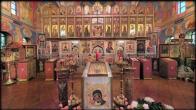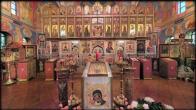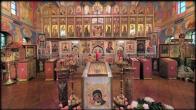You are here
Blessed are the meek, for they shall inherit the earth

Meekness is necessary in a spiritual person; the power of meekness erases anger, malice, enmity, and condemnation from the heart and adorns the soul with a gentleness.
Christ Himself was meek. Come unto me, all ye that labor and are heavy laden, and I will give you rest, said Christ. Take my yoke upon you, and learn of me; for I am meek and lowly in heart: and you shall find rest unto your souls. For my yoke is easy, and my burden is light (Matthew 11:28-30).
The Apostles of Christ also preached meekness. The Epistle of the Apostle James tells us:
Who is a wise man and endued with knowledge among you? let him shew out of a good conversation his works with meekness of wisdom. But if ye have bitter envying and strife in your hearts, glory not, and lie not against the truth. This wisdom descendeth not from above, but is earthly, sensual, devilish. For where envying and strife is, there is confusion and every evil work. But the wisdom that is from above is first pure, then peaceable, gentle, and easy to be entreated, full of mercy and good fruits... (James 3:13;17).
Let your moderation be known unto all men (Philippians 4:5), exhorts the Apostle Paul. He does not mean for us to be meek for show, but rather that we strive so that meekness becomes a widely recognized quality for Christians. The Apostle numbers meekness among the fruits of the spirit (Galatians 5:23).
Meekness means gentleness and kindness, freedom from selfishness and celebrity, and refusal to coerce and force matters. Meekness is to have a firm and quiet conviction that good is more powerful than evil, and that it can reach victory sooner or later. The words of Saint John Climacus tell us:
"Meekness is an unchangeable state of mind, which remains the same in honor and dishonor. Meekness consists in praying calmly and sincerely for a neighbor when he causes many turmoils. Meekness is a rock overlooking the sea of anger, which breaks all the waves that dash against it, yet remains completely unmoved. Meekness is the buttress of patience, the door, or rather, the mother of love, and the foundation of discernment, for it is said: The Lord will teach the meek His ways (Psalm 24:9). Meekness prepares us for the forgiveness of sins; it is boldness in prayer; an abode of the Holy Spirit. But to whom shall I look? Even to him that is meek and quiet. (Isaiah 66:2). In the hearts of the meek the lord finds rest, but a turbulent soul is a seat of the devil."
He, who is completely incapable of becoming angry, is not meek, but rather he who feels the movement of anger and restrains it, overcoming his sinful self-centeredness. The meek man never repays evil for evil, offense for offense; he does not become angry, does not raise his voice in anger against sinners and offenders... he shall not strive, nor cry; neither shall any man hear his voice in the street (Matthew 12:19), according to the word of the Evangelist.
It is possible to say, that the meek become like Christ, Who, as the Apostle Peter writes in his First Epistle, when he was reviled, reviled not again; when he suffered, he threatened not; but committed himself to him that judgeth righteously (I Peter 2:23). A good illustration of these words we find in the Prologue (12th of March).
A certain elder monk, Cyrus by name, being of low origin and very meek, was not liked by the brethren of the monastery where he was saving himself. It often happens because of humility or because of some other good quality, that someone will, in the end, become liked who previously was not liked; but the lot of the Venerable Cyrus was not such! In time, the hatred of the brethren increased: not only the elder brethren, but also the youths who were novices, insulted him and not infrequently even drove him away from the table. This continued for fifteen years.
The Venerable John of the Ladder happened to be in this monastery, we read further on in the Prologue. Seeing that the meek Cyrus, on being driving away from the table, frequently went to sleep hungry, he asked him: Tell me, what do these offences against thee mean? Believe me, beloved guest in Christ, answered the humble elder, the brethren do not act this way out of malice; they are only testing me to see whether I am worthy to wear the angelic habit. On entering this monastery, I heard that an anchorite must be tested for thirty years, and I have only lived here half that time.
This incident from the life of the Venerable Cyrus is an extreme example of Christian meekness, of which only a few are capable. The ascetic did not wish to take revenge on his persecutors, but even derived benefit for himself from their insults and accepted as the highest good fortune that which others would consider for themselves as misfortune and dishonor.
In general, all the saints were good teachers of meekness. One may further name the disciple of the Venerable Anthony the Great (251-356), the Venerable Paul the Most Simple (4/17 October) who by his life gave an example of blessed simplicity. The Venerable Sergius of Radonezh (25 September/8 October), by his gentle and meek words and persuasive speech, as the Church sings in one of the hymns in his honor. He reconciled the princes who were at enmity with one another. And here is a clear example of meekness from the life of the Venerable Theodosius of the Caves, the abbot of the illustrious Monastery of the Caves in Kiev:
Once, the Venerable Theodosius was conversing with the Great Prince Iziaslav until late in the evening. The Great Prince did not wish to let the Venerable One go to the Monastery by foot, and ordered one of his servants to take Saint Theodosius to the Monastery. But this servant, seeing the wretched clothing of the Venerable Theodosius, took him for a simple alms' collector, and said:
Monk, it is high time for me to rest in thy place. The Venerable Theodosius good-heartedly gave up his place to him, and himself began to drive the horses, and the servant fell asleep. In the morning, upon waking up, the servant saw that all the grandees coming to the Great Prince were bowing to the venerable Theodosius. His terror increased when, upon driving up to the Monastery, he saw that all the brethren came out to meet their abbot and with reverence received a blessing from him.
Not only the saints who lived in antiquity showed an example of evangelical meekness and simplicity. In our days too, the righteous also teach us holy meekness by the example of their life. In this connection, let us mention the Russian New-martyr, Metropolitan Benjamin (Kazanski) of Petrograd. At his trial in 1922, Metropolitan Benjamin in his final word said: I know not what you will announce in your sentence—life or death. Whichever it is, with reverence I turn my gaze on high, place upon myself the sign of the Cross and say: Glory to Thee, O Lord God, for everything. Shaved, in rags and with prayer on his lips, Metropolitan Benjamin went calmly to the place of execution. He uncomplainingly accepted a martyric death, remembering the words of Jesus: Whosoever doth not bear his cross , and come after me, cannot be my disciple (Luke 14:27).
The lot of martyrdom is not appointed for everyone, but we have the ability to be meek cross-bearers, according to the spirit of Christ's teaching, if, as the Apostle Paul says, we crucify our flesh with the passions and lusts (Galatians 5:24), if we preserve meekness and good-heartedness in the face of offences and insults, if we refrain from envy, anger, evil speaking and revenge.
How can we act otherwise, how can we get irritated, grow angry, take revenge? asks the holy righteous John of Kronstadt; and he says further: God, our common Father, before Whom we commit sins without number, always deals with us according to His meekness, does not destroy us, is longsuffering with us, ceaselessly benefits us. And with our brethren, we must be meek, condescending and longsuffering. For (according to the word of Christ) if ye forgive men their trespasses, your heavenly Father will also forgive you: but if you forgive not men their trespasses, neither will your Father forgive your trespasses (Matthew 6:14-15).
Furthermore, continues the righteous one of Kronstadt, all we, as Christians, are members of one body, and members take care of one another; besides, we are called sheep of the rational flock of Christ; why is this so? Because sheep are meek, free of malice, patient; such must we also be. Only those of us who are meek and free of malice, like lambs, belong to Christ's flock; but they who do not have Christ's spirit, His meekness and lack of malice ; they are not His. Complete Collection, vol. 1, pp. 173-174.
The only reliable path to salvation is to imitate the Lord Jesus Christ's meekness: His judgment by Caiaphas and Pilate, the painful minutes being nailed to the Cross, and the hours being crucified and blasphemed. These images show heavenly meekness to the world.
And the high priest arose, and said unto him, Answerest thou nothing? what is it which these witness against thee? But Jesus held his peace (Matthew 26:62-63)
We read in the Gospel according to Matthew, and in the Gospel according to Luke—
And when they were come to the place, which is called Calvary, there they crucified him, and the malefactors, one on the right hand, and the other on the left. Then said Jesus, Father forgive them; for they know not what they do (Luke 23:33-34).
We cannot bear the Cross of the Savior because His Cross is too heavy for us. But we must take up and bear our own cross in life, meekly enduring life's adversities for Christ's sake. The holy Apostle Peter says:
For this is thank worthy, if a man for conscience toward God endure grief, suffering wrongfully. For what glory is it, if, when ye be buffeted for your faults, ye shall take it patiently? but if, when you do well, and suffer for it, ye take it patiently, this is acceptable with God. For even hereunto were ye called: because Christ also suffered for us, leaving us an example, that ye should follow his steps: who did not sin, neither was guile found in his mouth; who, when he was reviled, reviled not again; when he suffered, he threatened not; but committed himself to him that judgeth righteously (I Peter 2:19;23).
Christ's third Commandment of Blessedness promises the meek that they will inherit the earth. This is true although difficult for contemporary man to comprehend in the context of stormy recent politics. States, parties and people continue fight for land and riches. Throughout history, people have fought over land and resources, making war and other violence, destroying so many human families as well other resources. The violence may well go on. Millions suffer in torment, and cannot see or take delight in the real beauty of our splendid earth, created by God.
Nevertheless, there are people who, as it is said in the Scriptures, have nothing, but posses everything (II Corinthians 6:10). These Christians ascetics live in the bosom of nature in deserts and mountains. Some of them were wanderers, who in Holy Russia went about the country on foot, from monastery to monastery, from one holy place to another. They delighted in the beauty of the land and were nourished by its excellent fruits. They breathed the pure air and drank spring water. They prayed to God beneath the open sky. They worked with their own hands, and they never took away land from anyone. And the land really belonged to them. And they, in their meekness, possessed it.
By the commandment of meekness, Christ foresaw not only such a possession of the earth. The time will come, when the earth in reality will belong to the meek. According to the word of the Apostle Peter, we, according to his promise, look for a new heaven and a new earth, wherein dwelleth righteousness (II Peter 3:13). By God's Judgement, the meek will become citizens of the Kingdom of Heaven, which the Psalmist calls the land of the living. I believe that I shall see the good things of the Lord in the land of the living (Psalm 26:15).
Meekness is freedom from this sinful world, but a loving attitude towards it. The world needs healing by meekness. And meekness is readiness to endure suffering patiently and with joy. Only in this kind of meekness, can one win Christian victor: not by self-denial but by sacrificial love. This Christian victory is directly opposite to any worldly victory that suppresses enemies or rivals with vindication of one's purpose and pretension. Christ's victory is to attract to Himself the hearts of men. His victory challenges all worldly wisdom about man and man's futile aspiration. Christ's victory is goodness, self-renunciation, and love.
All earthy experience adds up to a loss in the face of what the Gospel calls treasure in the heavens. The believing mind knows that all things earthly evaporate and lose their power to attract. It believing mind wants heavenly treasure to nourish it fully without fear of loss f any kind.
The commandment the meek shall inherit the earth expresses the existential truth that unselfish love irresistibly attracts the human heart. It is an invincible power. We know that a mysterious law operates. True victors may look like people suffering defeat. The contemporary French writer Albert Camus expresses this truth in these words: I cannot but believe those witnesses who gave themselves up to be killed.
Let us complete our sketch with the prayerful instruction of the contemporary teacher of meekness, the Venerable Siluan of Athos:
The soul of the humble is like the sea; toss a stone into the sea and for a minute it slightly disturbs the surface, and then falls into its depths. So do afflictions drown in the heart of the humble man, because the Lord's power is with him.
Where dwellest thou, O humble soul; and who liveth in thee; to what shall I liken thee?
Thou burnest brightly, like the sun, and burnest not out; but with thy warmth thou warmest all.
To thee belongeth the land of the meek, according to the word of the Lord.
Thou art like unto a flowering garden, in the heart of which there is a splendid home, where the Lord doth love to abide.
Thee do heaven and earth love.
Thee do the holy Apostles, Prophets, Hierarchs and Venerable love.
Thee do the Angels, Seraphim and Cherubim love.
Thee, the humble, doth the Most Pure Mother of the Lord love.
Thee doth the Lord love and rejoice over.
Archpriest Victor Potapov
PARISH LIFE
RECENT VIDEOS
Address of our Cathedral
Subscribe to our mailing list
While all the materials on this site are copyrighted, you may use them freely as long as you treat them
with respect and provide attribution on the Russian Orthodox Cathedral of St.John the Baptist of Washington DC.









